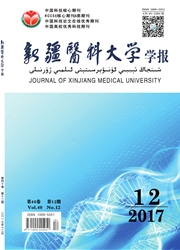

 中文摘要:
中文摘要:
Parkinson's disease (PD),a complex neurodegenerative disease,is characterized by the loss of dopamine neurons in the substantia nigra of the midbrain.PD patients have varying degrees of cognitive impairment (CI)1 that we term PD-CI.However,the etiology of these changes remains unexplained.We chose three Uygur male patients with PD-CI and three healthy controls of the same of nationality and sex to explore the pathogenesis of Xinjiang Uygur PD-CI using microarray-based gene expression profiling of monocytes. METHODS Subjects The cases were three Uygur men with PD-CI (sporadic) diagnosed by doctors of the First Affiliated Hospital of Xinjiang Medical University between November 2012 and January 2013.They were 65,72,and 75 years old and were screened using the BrainBank diagnostic criteria (United Kingdom).2 When necessary,diagnosis was confirmed using a head MRI or CT scan.Secondary PD,Parkinson's syndrome,hyperthyroidism and other genetic or neural diseases were excluded.The three healthy individuals in the control group were selected from a survey population about the incidence of PD in Urumqi and were of identical gender and ethnicity as the PD patients,but were not genetically related to the patient group.Their ages were 62,67,and 70 years.These six subjects were used for microarray-based analyzes.We also collected 31 cases of Uygur men with PD-CI (sporadic) and 35 healthy Uygur subjects for qRT-PCR verification of the microarray experiments.To investigate cognitive function,we used Mini-Mental State Examination (MMSE).MMSE scores of junior high school level ≤24 are considered to indicate cognitive disorders.This study was conducted in accordance with the Declaration of Helsinki and with approval from the Ethics Committee of the First Affiliated Hospital of Xinjiang Medical University.Written informed consent was obtained from all participants.
 英文摘要:
英文摘要:
Parkinson's disease (PD), a complex neurodegenerative disease, is characterized by the loss of dopamine neurons in the substantia nigra ot the midbraln. PD patients have varying degrees of cognitive impairment (CI) that we term PD-CI. However, the etiology of these changes remains unexplained. We chose three Uygur male patients with PD-CI and three healthy controls of the same of nationality and sex to explore the pathogenesis of Xinjiang Uygur PD-CI using microarray-based gene expression profiling of monocytes.
 同期刊论文项目
同期刊论文项目
 同项目期刊论文
同项目期刊论文
 期刊信息
期刊信息
